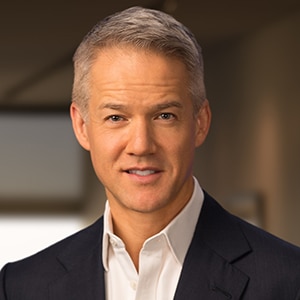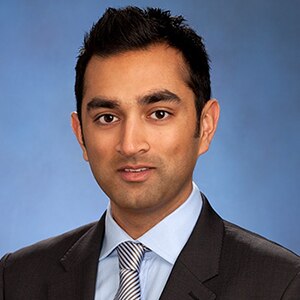Q&A with Goldman Sachs Asian Network Regional Heads Chris Kojima and Kunal Shah
In this Q&A, we catch up with Chris Kojima and Kunal Shah, regional heads of the Goldman Sachs Asian Network in the Americas and EMEA, who share a bit about their backgrounds and career paths, goals for the Network and advice for becoming an ally to the Asian community.
Tell us a little about yourself, your career path, and interests?
 Chris: I’m currently the co-head of Goldman Sachs’ Alternatives Capital Markets & Strategy Group, and serve on a number of our investment committees in the Asset Management Division. I started at Goldman Sachs in 1995 in Leveraged Finance, and then had the opportunity to lead a number of our private equity and alternative investments businesses within Goldman Sachs Asset Management. Throughout this time, I’ve been active in the firm’s diversity and inclusion initiatives, today serving as the head of the Asian Network in the Americas, on the board of advisors of Launch with GS, and as a member of the Americas Inclusion & Diversity Committee. Outside of Goldman Sachs, I serve on the boards of the Juilliard School and the New York Philharmonic, and a number of community organizations. At home, I also serve as co-chief homework monitor, technology regulator, and events coordinator for my four children.
Chris: I’m currently the co-head of Goldman Sachs’ Alternatives Capital Markets & Strategy Group, and serve on a number of our investment committees in the Asset Management Division. I started at Goldman Sachs in 1995 in Leveraged Finance, and then had the opportunity to lead a number of our private equity and alternative investments businesses within Goldman Sachs Asset Management. Throughout this time, I’ve been active in the firm’s diversity and inclusion initiatives, today serving as the head of the Asian Network in the Americas, on the board of advisors of Launch with GS, and as a member of the Americas Inclusion & Diversity Committee. Outside of Goldman Sachs, I serve on the boards of the Juilliard School and the New York Philharmonic, and a number of community organizations. At home, I also serve as co-chief homework monitor, technology regulator, and events coordinator for my four children.

Kunal: I joined Goldman Sachs in 2004 and currently serve as Global Head of Emerging Markets Trading in the Global Markets Division. In addition to working alongside Chris in the Asian Network, I am involved in various committees related to Diversity & Inclusion, including my role as co-chair of the Global Markets Inclusion and Diversity Committee and as a member of the EMEA Inclusion & Diversity Committee. I am honored to help support and further diversity, equality and inclusion at our firm and across the industry – as it relates to my own role, advancing gender diversity on the trading floor has been a big focus – and I also chair the board of EMpower (UK), the Emerging Markets Foundation, a global nonprofit focused on marginalized youth in emerging market countries.
For those unfamiliar with the Asian Network, how would you describe the role of this network and how has it helped our people?
Chris: Our role as a Network is to help drive impact through the power of diverse perspectives and experiences at the firm and to ensure our Asian population thrive within the Goldman Sachs environment. This is hugely important to the firm’s principle of being committed to creating an inclusive and diverse environment.
Kunal: We’ve had a vibrant and active Asian Network in EMEA for many years now; it started very much as a grass roots initiative and has grown to become one of the most popular inclusion networks in the region. The Network has had a large impact in fostering a sense of community and advocacy at the firm particularly over the past year which has at times seen the vast majority of our people working remotely.
"The Network has had a large impact in fostering a sense of community and advocacy at the firm."
Kunal Shah
How has the Asian Network at Goldman Sachs and the Asian community more broadly shaped your own lived experiences and worldview?
Chris: My Japanese grandfather was the age I am today when he and his young family were removed from their home in Canada, relocated from the west coast, separated and interned in camps during the Second World War. I myself grew up near the place of my father’s last relocation. While those events happened years ago, they shape who I am today. For much of my life, I saw myself as a half-Japanese, half-British, Canadian kid just wanting to fit in. I’m sure I joined Goldman Sachs 26 years ago as a young professional with that mindset firmly in place.
But what I found at Goldman Sachs was a place where I did fit in. Many of us at Goldman Sachs are the products of an unusual journey – whether taken by ourselves, our parents, or our grandparents. This is certainly true of the Asian Network. Ours is a special place that celebrates differences and embraces diversity, a community that gains strength and perspective from our collection of unlikely journeys.
At the same time, we all know that the work is unfinished. And each community has unique dimensions. Within our own network, the broad label of “Asian” obviously fails to capture the richness of individual cultures, geographies, and personal circumstances. And the broad label of “diversity” can over‐simplify the array of specific initiatives on which we’re all focused – recruiting, professional development, sponsorship, promotion, and inclusion – each of which presents different challenges and opportunities. But at Goldman Sachs, we’re taking important steps forward, listening and innovating and engaging. The firm’s leaders have always invested in our Asian community, both inside and outside the firm, and today the commitment is the strongest I’ve ever seen in my time at Goldman Sachs.
"What I found at Goldman Sachs was a place where I did fit in."
Chris Kojima
This has been a difficult time for the Asian community, with a continued surge of violence against members of the community and particularly elders – how can allies of the community help, and where do you look for support and hope in these difficult times?
Kunal: There are a few things that come to mind. I would say allies should check in with their Asian colleagues, friends and family to understand how recent events have impacted them and to see how they might need to be supported right now. You can also educate yourself about the history of Asian racism and inequality – while hate crimes and acts of xenophobia have been increasing and gaining recent media coverage, anti-Asian sentiment is not a new phenomenon. It’s important to understand how concepts such as the Model Minority Myth have served to conceal the systematic inequalities and challenges some groups within the Asian community face. Another step to take is to learn more about Asian culture and history, which is something I am trying to introduce my young children to alongside my wife’s Northern Irish heritage. Asian culture is not a monolith or homogeneous, Asia is the world’s largest continent and encompasses tremendous diversity in every aspect. It is important to recognize and learn about the huge diversity of voices within the Asian community to ensure individual identity is not erased.
Chris: These are incredibly challenging times for many diverse communities, and this is also true for our Asian populations. For the Asian community, the escalation in violence is shocking and heartbreaking, and the pandemic threatens to disrupt lives and livelihoods for years to come. It’s essential that we all get educated and engaged, learning how to identify problems, promote safety, confront aggression, and most effectively support our neighbors, colleagues and friends. This can be done in many ways, involving both time and resources, and across both big and small acts. The important thing is to get involved and contribute where you can. Within Goldman Sachs, we support many internal programs and outside organizations. As an example, we continue to partner with Ascend, a non-profit pan-Asian membership organization for business professionals in North America, and a coalition of partner organizations in pledging to combat anti-Asian stigma and all forms of bias based on race, ethnicity, gender, sexual orientation, religion, disability and veteran status.
How is the firm recognizing Asian Heritage Month?
Kunal: This is the first year the firm is recognizing Asian History and Heritage Month in both EMEA and America. Through the theme Asian Voices: Our Journey and Advocating Allyship the Network has planned a full calendar of events for the month of May to recognize the contributions of the Asian community to our firm, society and culture.
Chris: We have invited speakers from some of the leading non-profit organizations who have been supporting the Asian community to speak about the recent hate crimes and acts of xenophobia targeting members of the Asian community and to provide support and resources, MSNBC journalist and news presenter Richard Lui, and our own Asian partners at Goldman Sachs to discuss their own experiences as Asian professionals.
Looking beyond Asian Heritage Month, what are some key objectives of the Asian Network in 2021?
Kunal: Speaking to Chris’ points on the diversity and breadth of the Asian community, my experience as a second generation Asian professional born and raised in London may be very different to someone who has recently relocated to the region from Asia for example, let alone all the different cultures and countries encompassed in the term Asian.
As a Network, we’re very focused on understanding these diverse experiences and how we can be more inclusive. For the first time, the firm is taking a strategic look at this and we are working closely with the Diversity and Inclusion team to understand these experiences through surveying our population. We are doing this to help ensure we are delivering programming and initiatives relevant for everyone in our community, whilst reviewing the people data and ensuring a diverse talent pipeline with a focus on representation at the senior ranks.
What advice do you have for someone who would like to contribute to these efforts or get involved within their own affinity or community?
Chris: When we look back on 2020 and 2021, I think we’ll see this window as a time when we were anxious, sometimes afraid, and always missing the people we care about. But I think we’ll also see this time as a moment when people found common ground, working together to defend against dangers that threaten everyone. A time when strangers supported each other, and cheered at night for first responders. A time of tragedy and hope, of awakening and resolve, of gratitude and commitment. No matter what our backgrounds are, we’re all connected by these things. Our inclusion networks welcome everyone, create a special place for engagement, and empower a unique opportunity to scale our individual contributions into something that has a much bigger and enduring impact.

